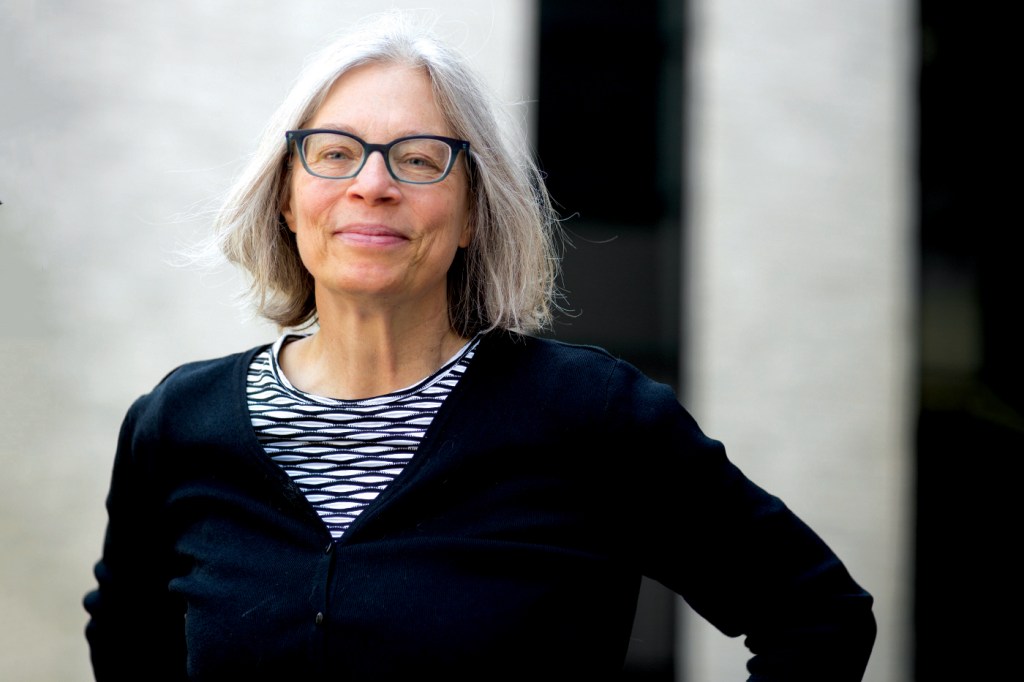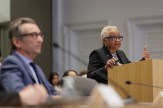Affordable access to water is ‘a fundamental human right’

Affordable access to water is an issue that affects every household in the U.S. and is made even more critical during the COVID-19 pandemic, says Martha Davis, a professor of law at Northeastern who has been promoted to University Distinguished Professor.
In the U.S., water authorities often shut off water when customers fall behind in their payments. But without access to water, families may be forced to go to other people’s homes, or outside to wash their hands or buy water, she says. In response, some states, such as Michigan, have ordered a moratorium on water shut-offs while shelter-in-place orders are in effect. Davis argues that the pandemic should make communities rethink how they handle the question of access to affordable water.
Experts project that by 2022, 36 percent of households in the U.S. will struggle to pay their water bills. A 2019 report written by Davis in collaboration with Sharon Harlan, a professor of health sciences and sociology, and Laura Senier, an assistant professor in sociology and anthropology and health sciences, looked at policies regulating the affordability of water in 12 communities in Massachusetts and how local and state laws across the U.S. influence access to drinking water.
“Water that is affordable, as well as accessible and safe, is a fundamental human right,” the report states.
Among its most important findings, the report found that some cities shut off water to discourage payment delinquency, while others convert unpaid water bills to tax liens, which has sometimes led to foreclosures and loss of housing. In addition, the report showed, though rising water costs plague homeowners and renters alike, they tend to fall hardest on people of color who are low-income.
To cope, water customers reported making significant sacrifices, found Northeastern doctoral student Mariana Sarongo, another member of the team. One interviewee said she was cutting back on needed medications to afford water, while another participant said she was unable to afford a money-saving vegetable garden because it cost too much to water the produce.
“COVID-19 makes clear that these issues are not simply individual problems, but should instead encourage community-wide responses to ensure affordable water for all,” says Davis, who is also associate dean for experiential education at Northeastern.
The title of University Distinguished Professor is the highest honor the university can bestow upon a faculty member. It is conferred at the behest of Northeastern’s president, Joseph E. Aoun, and provost, Ken Henderson, upon faculty members who have earned international recognition and distinction for their transformative educational and scholarly contributions.
Davis says she appreciates the support from her law school colleagues who nominated her, describing the recognition as “the honor of my life.”
“I am particularly pleased to receive this recognition because of the increased visibility it will give to the law school’s human rights work—particularly critical given the COVID-19 crisis—and the NuLawLab, the law school’s dynamic innovation engine,” she says.
Davis was nominated by several members of the Northeastern law faculty, including Emily Spieler, Margaret Burnham, Richard Daynard, Daniel Medwed, and Michael Meltsner.
“Professor Davis brings to all of her pursuits fiery intelligence, intellectual honesty, extraordinary energy, creativity, and an unwavering commitment to the furthering of justice and law—law in theory and law in practice, as well as innovation in law to expand access to justice,” they wrote in their nomination letter.
Davis, who is also associate dean for experiential education and a faculty director for the law school’s Program on Human Rights and the Global Economy and the NuLawLab, is a member of the expert pool for WaterLex, a Geneva-based development organization that advocates for water and human rights.
In addition to water affordability, she has written on human rights, women’s rights, and social justice issues. She co-edited “Global Urban Justice: The Rise of Human Rights Cities,” which examines cities that base their local policies on human rights, a text to which she also contributed a chapter, titled “Cities, Human Rights and Accountability: The United States Experience.”
Davis co-authored the first law school textbook on human rights in the U.S., titled “Human Rights Advocacy in the United States,” and she co-edited “Bringing Human Rights Home,” a three-volume text chronicling the human rights movement in the U.S. Her book, “Brutal Need: Lawyers and the Welfare Rights Movement,” received the Reginald Heber Smith Award and was also honored by the American Bar Association. Her articles have appeared in numerous publications, including the Yale Law Journal, the North Carolina Law Review, and Fordham Law Review.
Prior to joining Northeastern in 2002, Davis was vice president and legal director for the Legal Momentum. Formerly known as NOW Legal Defense and Education Fund, the organization is the oldest legal advocacy group for women in the U.S.
As a women’s rights practitioner, Davis litigated a number of cases before the U.S. Supreme Court, and argued Nguyen v. INS, a case that challenged sex-based citizenship laws. She has also completed fellowships at the Bunting Institute, the Harvard Law School, and Harvard’s Kennedy School of Government.
For media inquiries, please contact media@northeastern.edu.





